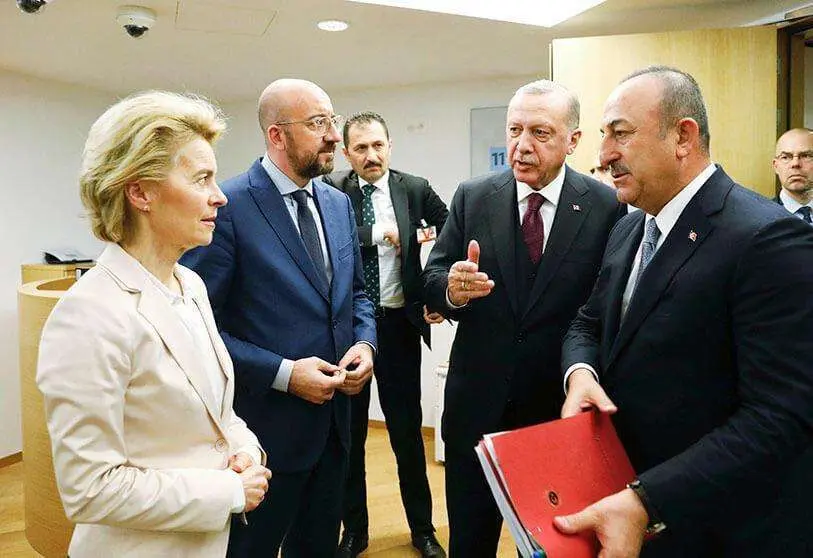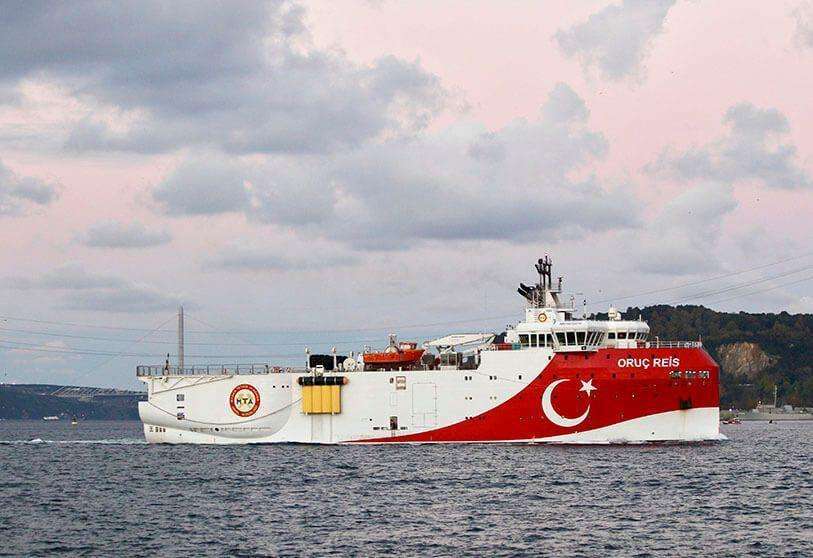Europe extends sanctions against Turkey over the eastern Mediterranean crisis

The taboo subject that nobody wanted to touch in the European Commission has ended up falling by its own weight. After postponing the talks, the Council of the European Union (EU) adopted on Friday a one-year extension of the existing framework for imposing sanctions, which already affect two people, in response to Turkey's 'unauthorised' oil exploration in the eastern Mediterranean, in waters close to Cyprus and Greece.
In doing so, "the European Union will maintain its ability to impose specific restrictive measures on persons or entities responsible for or involved in unauthorised oil drilling activities in the Eastern Mediterranean", underlined the Council of the EU in a press release.
The punitive measures will continue at least until November 2021. Since February, this plan concerns mainly two Turkish oil companies because of their involvement in unauthorised drilling activities off the Cypriot coast in the Eastern Mediterranean.
In particular the individuals sanctioned are two leaders of the Turkish oil company TPAO. They are the company's vice-president, Mehmet Akalin, and the deputy director of the Exploration Department, Ali Coscun Namoglu.
The sanctions imposed by the EU club consist of a ban on travel to EU territory and the freezing of assets, both for individuals and entities. In addition, persons or entities in the Union are prohibited from making funds available to any person on the sanctions list.
In November 2019, the Union gave the green light to the legal framework to adopt restrictive measures in response to these activities, and in July of the same year decided to suspend negotiations with Turkey on an aviation agreement, cancel high-level political meetings, reduce funds earmarked for the country as a candidate state for EU membership and restrict European Investment Bank lending.

Turkey's tug-of-war in the eastern Mediterranean has strained relations with the European Union. In October 2018, Turkey sent a first drilling vessel to search for natural gas in the waters off the island of Cyprus, despite the tensions with Greece and the EU club caused by previous exploration.
Not content with this, Turkey sent a second vessel in June 2019. With the excuse that the Libyan National Accord Government (NAG) had given it the maritime space for its activities, the Anatolian country started to explore within the exclusive economic zones (EEZs) of Cyprus and Greece.
Gas exploration and prospecting activities in the waters in dispute with Greece and Cyprus have been one of the issues that have most strained relations between Turkey and the European bloc and have been on the agenda of European Councils that bring together the Union's heads of state and government. France has furthermore intervened militarily in the Mediterranean, providing support to Greece and exerting pressure on the ground to prevent Turkey from continuing with its activities.
During October, the director of the Atlantic Alliance (NATO), Jens Stoltenberg, attempted to calm the waters by opening a direct line of communication between Turkey and Greece. At this point Turkey withdrew its ships and it seemed that the tension would disappear. The idea of two Alliance member countries clashing in this way unsettles Stoltenberg, who sees NATO's strength falter.
But it was not a week before the prospecting ship 'Oruc Reis' returned to action, along with two other tracking ships, leaving all the European commissioners who are avoiding harsh sanctions against Turkey astonished.

Following a diplomatic initiative led by Germany, the Union has undertaken to review relations with Turkey in December, pending the cessation of Ankara's belligerent actions in the region. If not, European leaders will consider sanctions directly against Recep Tayyip Erdogan's government.
It is important to remember that Turkey currently controls the migratory tapthat goes to Europe and also maintains and controls the gas and oil pipelines that provide heating to the countries in the north of the Union.
The new summit to be held in December points towards a package of tough measures for Turkey. Previously Cyprus and Greece were the only advocates of sanctions on the Ottoman country, but now it seems that France will also join in. "We will promote strong European reaction measures, whose last tool is sanctions," the French Secretary of State for European Affairs, Clément Beaune, told the Senate.
The President of the European Council, Charles Michel, stressed that "the December summit would serve to take stock of the situation", declarations before which the Greek Prime Minister, Kyriakos Mitsotakis, indirectly requested "an embargo on the sale of arms to that country".
On an international level everyone is watching Erdogan, as he is present in most of the hotbeds of tension of the new world order, from Libya to the Aegean Sea, Syria, Iraq and now also in Nagorno-Karabakh.








